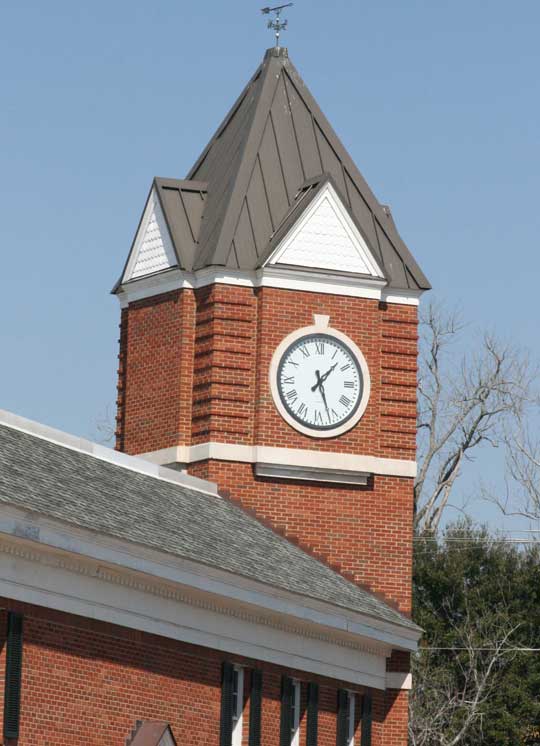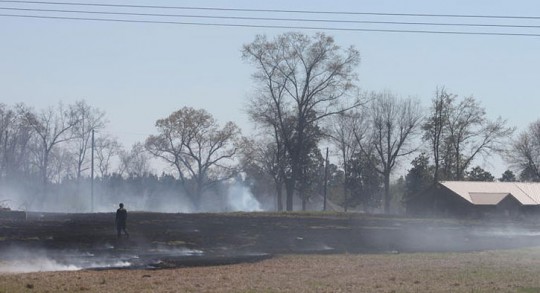Greg Evers Weekly Wrap-Up: Septic Tanks, Gun Open Carry, Health Care
March 13, 2011
This week marked the beginning of the 2011 legislative session. I am working hard with my fellow legislators to represent and serve the people of District 2 and to pass legislation that will help protect our communities and restore Florida’s economy and workforce.
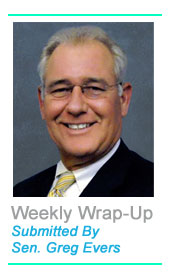 Senate Bill 168, my bill permanently repealing the septic tank inspection requirement, is pending in the Senate Environmental Preservation and Conservation Committee. I will continue to fight to get this bill passed to provide relief from unnecessary, expensive and burdensome government intrusion.
Senate Bill 168, my bill permanently repealing the septic tank inspection requirement, is pending in the Senate Environmental Preservation and Conservation Committee. I will continue to fight to get this bill passed to provide relief from unnecessary, expensive and burdensome government intrusion.
Senate Bill 234, relating to the open carry of firearms, continues to be a priority for me and will be up for a vote on the afternoon of Monday, March 14th in the Senate Criminal Justice Committee. During a committee meeting this past week, the bill was amended to remove the provision that would have allowed for concealed carry license holders to carry firearms on college campuses for self defense and other lawful purposes. While I continue to believe that a Floridian’s Second Amendment right of self defense should apply on college and university campuses in our state, I also understand that compromise is a necessary part of the legislative process. I intend to continue to work to defend our Second Amendment rights and I look forward to the debate and consideration of Senate Bill 234 in committee next week.
On Wednesday, the Senate passed Senate Joint Resolution 2, which will allow Floridians the opportunity to vote on a constitutional amendment in 2012 that will protect their rights to make their own health care decisions, free of government intervention. I look forward to the Florida House of Representatives taking up and passing this proposed constitutional amendment so that it will be on the general election ballot in 2012, allowing Floridians to vote for their health care freedom.
This week I had the unique opportunity to speak with tea party movement leaders across our state, including several leader-activists from the Panhandle. Their input, enthusiasm and dedication to the betterment of our great state and country is inspiring. I want to extend a special thank you to these dedicated citizens who took the time to come to Tallahassee and meet with my colleagues and myself. I encourage all of you to do the same.
I want to take this opportunity to remind you of the upcoming 2011 Lincoln Day Dinner being held at New World Landing in Pensacola on the evening of Friday, March 25, 2011 from 6 – 9 p.m. Hosted by The Escambia County Republican Executive Committee, the dinner will feature Governor Rick Scott as guest speaker of the night. I invite those of you interested in purchasing tickets to contact Chairman@EscambiaRepublicans.com. I am looking forward to attending and would love to see you there.
As always, please continue to send me your priorities and concerns for the legislative session. For further assistance, do not hesitate to contact me at greg@gregevers.com or call my office at (850) 689-0556 with any questions or concerns.
Thank you for your continued input and support!
Greg Evers
Bill Would Cut Citizens Property Insurance Reach
March 13, 2011
The state-run insurer of last resort would not cover newly constructed homes in the state’s most hurricane-prone areas under a provision to be introduced next week and backed by a oddly diverse coalition of interests who who usually don’t agree.
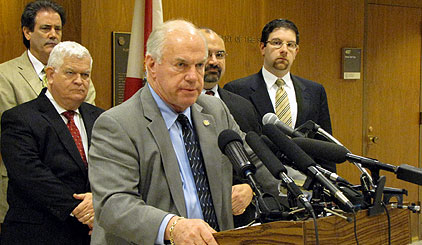 Sen. Alan Hays, R-Umatilla, said Friday that will propose to prevent Citizens Property Insurance Corp. from offering new policies in coastal and high risk areas of the state.
Sen. Alan Hays, R-Umatilla, said Friday that will propose to prevent Citizens Property Insurance Corp. from offering new policies in coastal and high risk areas of the state.
The provision, which Hays plans to offer as an amendment to another insurance measure he’s sponsoring, would also prohibit the state-backed insurer after June 1, 2012 from providing coverage to owners who remodel existing homes if the fix up increases the value of their home by 50 percent or more.
The provisions would not drop coverage for the 400,000 Citizens policyholders who currently are in the company’s high risk pool for wind or multi-peril coverage.
The underlying bill, SB 1714, makes changes that would reduce the number of coastal residents insured by the state-run pool. Citizens has seen its ranks swell in the past several years as private companies like Allstate, Nationwide and others bail out or dramatically reduce their books of business across the state. Now, with 1.2 million policyholders, Citizens is the largest property insurer in state.
Joining Hays in supporting the proposal are environmentalists, who support slower growth along the coasts.
Hays and other conservatives are pushing the idea because of their opposition to the state taking such a large role in the insurance business, and the peril in which it puts the taxpayers in the event of a large loss for Citizens.
“My goal is to depopulate Citizens, to make it as small as we can make it as rapidly as we can,” Hays said.
Citizens currently has $400 billion in exposure in coastal regions but has only $4.5 billion in reserves. In the event of a catastrophic storm, Citizens would pay its claims by assessing all property and automobile insurance policyholders, a scenario critics say is patently unfair.
“The Citizens Property Insurance Corp. is a threat to Florida’s fiscal well-being, it’s a threat to residents’ safety and it is a threat to the environment,” said Eli Lehrer of the Heartland Institute, a fiscally conservative organization that wants the state out of the insurance business.
On Friday, Hays was joined at a news conference by representatives of the Florida Wildlife Federation, 1,000 Friends of Florida, the Sea Turtle Conservancy. They stood side by side with representatives of fiscally conservative organizations like Heartland, the James Madison Institute, Americans for Prosperity and the Tallahassee Tea Party that support the measure.
“Some of these areas are some of our state’s most valuable coastal habitats,” said Manley Fuller of Florida Wildlife Federation “We think this bill is a place … where conservation and good economic sense come together.”
Hays plans to add the provision to SB 1714, filed earlier this week, that allows Citizens to increase residential policyholders’ rates by 25 percent on any single policy, excluding coverage changes and surcharges, and restricts who could purchase insurance from the state-backed insurer.
The proposal makes a number of changes to Citizens, including a phase out of Citizens coverage for the most expensive homes, with the state-run insurer by 2016 only covering homes worth less than $500,000. It also would prohibit Citizens policyholders from using public adjusters to file claims.
Officials at Citizens didn’t return a call for comment Friday.
Jack McDermott, spokesman at the Office of Insurance Regulation, said the office supports the underlying bill, but couldn’t comment yet on the proposed amendment.
Pictured: Sen. Alan Hays talks to reporters about his Citizens Property Insurance Corp. proposal in Tallahassee. Photo for NorthEscambia.comm, click to enlarge.
By Michael Peltier
The News Service of Florida
Featured Recipe: Crispy Hot Wings
March 13, 2011
This weekend’s featured recipe from Janet Tharpe is Crispy Sticky Hot Wings. They are close to famous restaurant hot wings. Add more hot sauce for an extra kick.
To print today’s “Just a Pinch” recipe column, you can click the image below to load a printable pdf with a recipe card.
Diane Jane Rothrock
March 13, 2011
On March 8, 2011 Diane Jane Rothrock joined her Lord & Savior in heaven after a valiant effort to overcome complications from a bout of flu.
Diane was born and raised in Tacoma, Washington where she was part of the 1952 graduating class of Fife High School. In 1961 she moved to Cantonment, FL along with her husband Coman Wendell Rothrock, Jr, and worked as the receptionist for Champion International Paper Company for over 20 years before retiring.
Diane had numerous hobbies including traveling, gardening, and decorating, but with her God given gift of hospitality, she especially found great delight and joy in cooking and entertaining in her home in order to be an encouragement and blessing to others.
As a believer and follower of Christ, she was faithfully involved in church activities, Bible studies, and personal spiritual growth throughout her lifetime.
In 2006 Diane moved to Grand Rapids, Michigan, near her daughter, grandchildren, and great grandchildren and in 2009 she moved to Sun City West, Arizona, again to be near daughters, grandchildren, and great-grandchildren.
A few knew her as “Mom”, some knew her as “Grandma”, and some affectionately knew her as “GG” (Great Grandma). Countless others in her life called her a dear friend and finally, Christ her Savior, graciously called her home.
A memorial service will be held in her honor at 11:00 a.m. on Monday, March 14, 2011, at Faith Chapel Funeral Home in Cantonment, Fl.
Faith Chapel Funeral Home North, 1000 Highway 29 South Cantonment is in charge of arrangements.
Did You Remember To Spring Forward?
March 13, 2011
Did you remember to Spring Forward? Today is the first day of Daylight Savings time. The clock at the Escambia County Bank in Flomaton (pictured) is one of the largest clocks in the area. Bank officials say the clock is rather easy to “spring forward” — it is all electronic. NorthEscambia.com photo.
Time Change: Spring Forward (And Don’t Forget The Smoke Alarm Batteries)
March 12, 2011
Don’t forget to “spring forward” and set your clocks ahead one hour before heading off to bed Saturday night. Daylight Saving Time begins Sunday, making use of longer summer days, allowing people to rise early and spend more of the day working or playing.
 As you “spring forward” with the change to daylight-saving time, Escambia County Fire Rescue wants to remind residents to make another change that could save lives — changing the batteries in smoke alarms.
As you “spring forward” with the change to daylight-saving time, Escambia County Fire Rescue wants to remind residents to make another change that could save lives — changing the batteries in smoke alarms.
The peak time for home fire fatalities is between 10 p.m. and 6 a.m. when most families are sleeping, according to Escambia Fire Rescue.
It is also recommended that residents test smoke alarms by pushing the test button, planning “two ways out” and practicing escape routes with the entire family. Families should also prepare a fire safety kit that includes working flashlights and fresh batteries.
Communities nationwide witness tragic home fire deaths each year. An average of three children per day die in home fires and 80 percent of those occur in homes without working smoke alarms. Non-working smoke alarms rob residents of the protective benefits home fire safety devices were designed to provide. The most commonly cited cause of non-working smoke alarms: worn or missing batteries.
Tragically, fire can kill selectively. Those most at risk include:
- Children — Approximately 1,000 children under the age of 20 die each year in home fires. Children under age five are at twice the risk of dying in a home fire. Eighty percent of fatal home fire victims who were children were killed in homes without working smoke alarms.
- Seniors — Adults over age 75 are three times more likely to die in home fires than the rest of the population; those over 85 are 4.5 times more likely to die in a home fire. Many seniors are unable to escape quickly.
- Low-Income Households — Many low-income families are unable to afford batteries for their smoke alarms. These same households often rely on poorly installed, maintained or misused portable or area heating equipment — a main cause of fatal home fires.
Changing smoke alarm batteries at least once a year is one of the simplest, most effective ways to reduce these tragic deaths and injuries. In fact, working smoke alarms nearly cut in half the risk of dying in a home fire. Additionally, the International Association of Fire Chiefs recommends replacing your smoke alarms every ten years.
For more information about fire safety, call Escambia County Fire Rescue at 850-475-5530 or visit our web site at www.myescambia.com.
For information about obtaining a free home smoke alarm call 850-595-HERO (4376).
Molino Brush Fire Consumes Several Acres
March 12, 2011
Firefighters were able to quickly contain a brush fire Saturday afternoon in Molino before it reached two nearby structures.
The fire, which started as a control burn, consumed several acres on Chance Road near Chestnut Road during the early afternoon hours. The Molino and Cantonment stations of Escambia Fire Rescue and the Florida Division of Forestry responded to the blaze.
Pictured above and below: A brush fire consumed several acres on Chance Road in Molino Saturday afternoon. NorthEscambia.com photos by Kristi Smith, click to enlarge.
Great Weather Weekend
March 12, 2011
We have a pretty good weather weekend in store as we spring forward to Central Daylight Time — don’t forget to set your clocks ahead one hour before heading to bed Saturday night.
Here is your official North Escambia area forecast:
- Tonight: Patchy fog after 3am. Otherwise, mostly clear, with a low around 41. South wind around 5 mph becoming calm.
- Sunday: Patchy fog before 7am. Otherwise, mostly sunny, with a high near 78. Calm wind becoming south between 5 and 10 mph.
- Sunday Night: Mostly cloudy, with a low around 49. South wind around 5 mph becoming calm.
- Monday: A 20 percent chance of showers and thunderstorms after noon. Partly sunny, with a high near 77. Calm wind becoming south between 10 and 15 mph.
- Monday Night: A 40 percent chance of showers and thunderstorms. Mostly cloudy, with a low around 54. South wind between 5 and 10 mph.
- Tuesday: Mostly sunny, with a high near 75. South wind between 5 and 10 mph.
- Tuesday Night: Mostly clear, with a low around 46. Southwest wind around 5 mph becoming calm.
- Wednesday: Sunny, with a high near 77. Calm wind becoming northeast around 5 mph.
- Wednesday Night: Mostly clear, with a low around 48. South wind around 5 mph becoming calm.
- Thursday: Sunny, with a high near 77.
- Thursday Night: Mostly clear, with a low around 52.
- Friday: Sunny, with a high near 80.
- Friday Night: Mostly clear, with a low around 51.
Florida Weekly Government Roundup: Don’t Blink, Or You’ll Miss It
March 12, 2011
Don’t blink.
If you close your eyes for even a minute these days, you might miss the sale of a state plane, the canceling of a train project – or two – a major change in the way teachers are paid, all kinds of things that seem to be happening in the blink of an eye, at least in terms of the usual government time for getting things done.
When Gov. Rick Scott gave his first State of the State speech this week and urged legislators, “don’t blink,” that wasn’t exactly what he meant, but people could have taken it that way.
 In a whirlwind week for the Legislature and for Scott, a front-loaded legislative agenda had major pieces of legislation sailing through one chamber or the other.
In a whirlwind week for the Legislature and for Scott, a front-loaded legislative agenda had major pieces of legislation sailing through one chamber or the other.
In the first week of the 2011 session, the Senate passed a complete change in the way teachers are paid, voting to end a years-old system where educators are compensated based on their tenure to one where they get raises based on their students doing well on tests.
Also in the first week, the House voted to shorten the length of time unemployment benefits are available in an effort to help out businesses who say all the people without jobs are costing them too much. That’s a major change for the unemployed who would see their benefits end sooner if the proposal gets through the Senate.
If that wasn’t enough excitement, late in the week Scott put the brakes, at least for now, on central Florida’s SunRail, a commuter train system legislators approved a couple years ago.
Don’t blink, indeed.
What Scott meant when he told lawmakers to keep their eyes wide open during his State of the State address on Tuesday evening was that they shouldn’t be afraid of bold change, of standing up to interest groups who will urge lawmakers to go slow, to think carefully about the consequences before doing big things, or undoing things. Consequences be damned – Scott clearly isn’t a plodder or, really, much of a compromiser.
Making quick, bold decisions without slowing down to get buy-in from all the parties involved has become the new governor’s signature, and he promised in his State of the State that those who want him to tread carefully would be disappointed. They are, he said, simply wrong, which would appear to mean, by extension, that he is right.
“There are (those) who agree on our policy but say that our agenda is too bold – that we need to trim the sails of our imagination and settle for small improvements,” Scott said. “They’re wrong.”
Some legislators might have “thoughtful, constructive modifications” to Scott’s effort to create jobs, he acknowledged. And he said that might be OK. But he warned them not to lose focus on what he – and in his mind many of them – want to do, or blunt his momentum.
That Scott even bothered to go to the Legislature and deliver the State of the State may have surprised some lawmakers, several of whom have said pointedly that Scott should be more respectful of the Legislature’s role in policy making in Florida. And those are just the Republicans.
Here’s one Republican – Sen. Thad Altman – who has already gone to court in an effort to block Scott from killing high speed rail, only to become incensed again late this week when he blinked for a minute and Scott put SunRail on hold:
“He doesn’t respect the legislative process, and the fact that we had a special session where this project was debated and vetted,” Altman told the Orlando Sentinel. “Eventually his bad decisions will catch up with him. The unfortunate thing is how much damage he will do to the people of Florida before it does.”
Wow.
But there Scott was this week, standing before the roughly 160 people who he has come to find out he is supposed to share some power with, asking them to work with him to create jobs, not try to stand in his way.
“I did not fight to become the 45th Governor of the greatest state in the nation to settle for a status quo that does not promote the enormous potential of our people. I am completely committed to this mission,” Scott told them.
“Don’t blink. Don’t let special interests persuade you to turn your back on the people who elected you,” he said.
The state of the state is not particularly good – and Scott acknowledged that.
In the same week when state officials announced that unemployment in January ticked down only slightly and still hovers right around 12 percent – just where it was a year ago – Scott said there were lots of people looking at the first week of the regular legislative session more like an emergency session. They need jobs, he repeated.
Some of those unemployed people were actually at the Capitol this week, though, rather than screaming for Scott to create jobs, they were protesting legislative plans to cut their unemployment benefits off.
There were other protesters at the Capitol this week – tea partiers showing their support for Scott and union members trying to show their dismay at several proposals pushed by Republicans. But the numbers were pretty small – many inside the Capitol could go about their business without really even noticing much about the demonstrations outside.
While much of the theme of Scott’s speech was being bold and not being afraid to dramatically change the status quo, Republicans in the Legislature and Scott and his fellow Cabinet members also moved in a couple of ways this week to block change.
The Senate on the first day of the session voted to ask voters to block the federal health care law – saying that change isn’t what people want. Floridians could still have the right to go without health insurance if the House agrees with the Senate and voters then vote to change the constitution, though it’s not clear if the courts would go along with that idea.
Scott and his fellow members of the Cabinet, sitting as the Executive Clemency Board, also moved to reverse course on some change that was hailed as groundbreaking a few years ago (although primarily by liberals). The board led by Scott and Attorney General Pam Bondi voted to reverse a change that had made it easier for ex-felons to get their civil rights back.
When the previous board – with four entirely different members – had voted four years ago to do that, it was hailed as an end to a remnant of the Jim Crow era that had kept former felons disenfranchised. Scott and Bondi said this week, however, that ex-felons should have to work a little harder to prove they’re ready for the responsibility of voting and other rights they’ll now have to work harder to regain.
That one also could be bound for that other branch of government that seems to get in the way when people have big bold ideas, the courts.
Speaking of the courts, House Speaker Dean Cannon also got in on the whole big bold change thing this week. Cannon, who has been clear about his concern about judicial overreaching, proposed this week that the Supreme Court should be split in two, with five justices hearing civil appeals and five justices hearing criminal appeals.
That would be a radical departure from the current seven member court, and it would also require a constitutional change.
So don’t blink.
STORY OF THE WEEK: In the blink of an eye, major pieces of legislation come to the floors of the Senate and House in the first week of the legislative session. Gov. Rick Scott delivers a State of the State speech that urges lawmakers to come with him as he seeks to make dramatic changes.
QUOTE OF THE WEEK: “We have a unique opportunity to put government back in its proper place and show the nation how private-sector growth leads to prosperity. Such a moment may not come again. My ‘jobs’ budget has plenty of critics. Some critics are accustomed to big government and will fight to protect special interests, and there are others who agree on our policy but say that our agenda is too bold – that we need to trim the sails of our imagination and settle for small improvements. They’re wrong.” Gov. Rick Scott in his State of the State speech.
By David Royse
The News Service of Florida
Sheriff’s Office: Escambia Seeing Reduction In Crime
March 12, 2011
A new proactive crime-fighting unit, more deputies on the street and a focus on gun related crimes has resulted in a reduction of crime in Escambia County.
One month after the implementation of these tactics as well as other tactics outlined in a strategic plan aimed at reducing violent crimes in Escambia County, the Escambia County Sheriff’s Office has seen an overall decrease in crime.
Since December of 2010, the Sheriff’s Office has seen a steady decrease in index crimes, which includes crimes against persons such as homicide, sex offenses, robbery and aggravated assault or battery, and property crimes such as burglary, larceny, and vehicle theft. Crimes against persons declined 13 percent from December 2010 to January 2011 and 20 percent from January 2011 to February 2011. Property crimes declined seven percent from December to January and six percent from January to February.
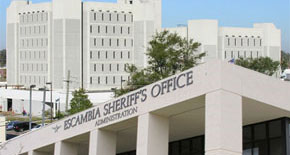 When compared to the previous year’s crime statistics, the Escambia County Sheriff’s Office also saw a decrease in total index crimes including a 25 percent decrease in crimes against persons and a three percent decrease in property crimes. Arrests were up five percent in January compared to the previous year.
When compared to the previous year’s crime statistics, the Escambia County Sheriff’s Office also saw a decrease in total index crimes including a 25 percent decrease in crimes against persons and a three percent decrease in property crimes. Arrests were up five percent in January compared to the previous year.
This trend continued in February with a continued reduction in total index crimes although there was a slight increase in property crimes of seven percent. Crimes against persons in February 2011 declined 41 percent from 166 crimes in February 2010 to 97 crimes in February 2011. Arrests were down by three percent compared to February 2010, which could be attributed to the reduction in criminal activity.
“The increase we are seeing in property crimes is mostly made up of larceny offenses, which can be economically driven. We take this information very seriously and hope that our community policing efforts and increases in our Neighborhood Watch Programs will assist us in reducing these numbers,” said Sheriff David Morgan.
 This overall decline in crime in Escambia County can be attributed to the increase in the number of officers patrolling the community through both the Tactical Anti-crime Unit (TAC) and the Desk to Road Program. The Sheriff’s Office implemented the TAC Unit in September of 2010 and increasing it to a 14-person unit in November of 2010. This unit focuses on community policing efforts in high crime areas, street-level drug activity and violent crimes.
This overall decline in crime in Escambia County can be attributed to the increase in the number of officers patrolling the community through both the Tactical Anti-crime Unit (TAC) and the Desk to Road Program. The Sheriff’s Office implemented the TAC Unit in September of 2010 and increasing it to a 14-person unit in November of 2010. This unit focuses on community policing efforts in high crime areas, street-level drug activity and violent crimes.
The Desk to Road program, implemented in January of 2011, requires officers assigned to administrative positions at the Sheriff’s Office to dedicate time during their workweek to patrolling the community and supplementing the patrol section. This is in addition to their normal work requirements and includes officers of all ranks.



